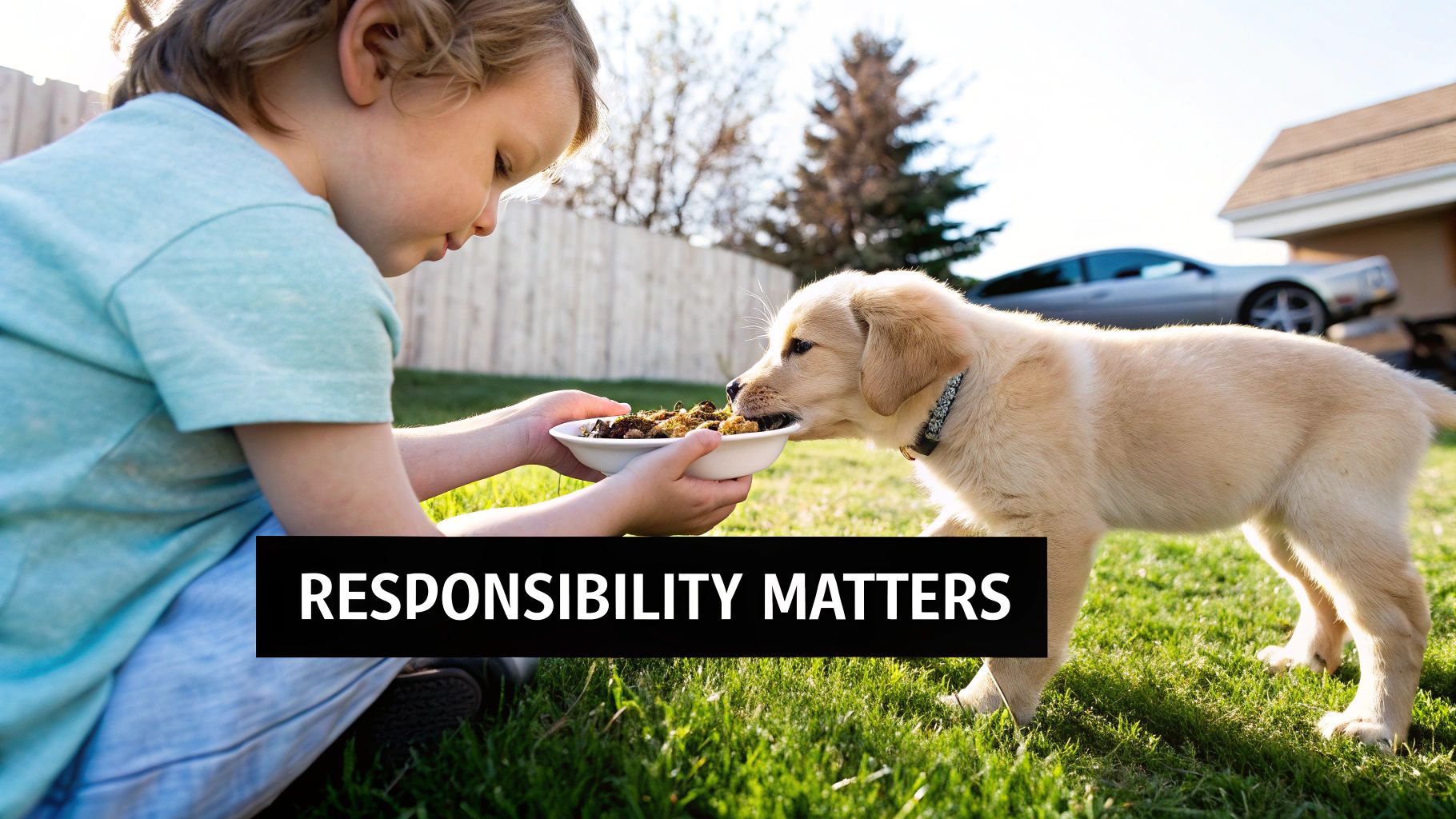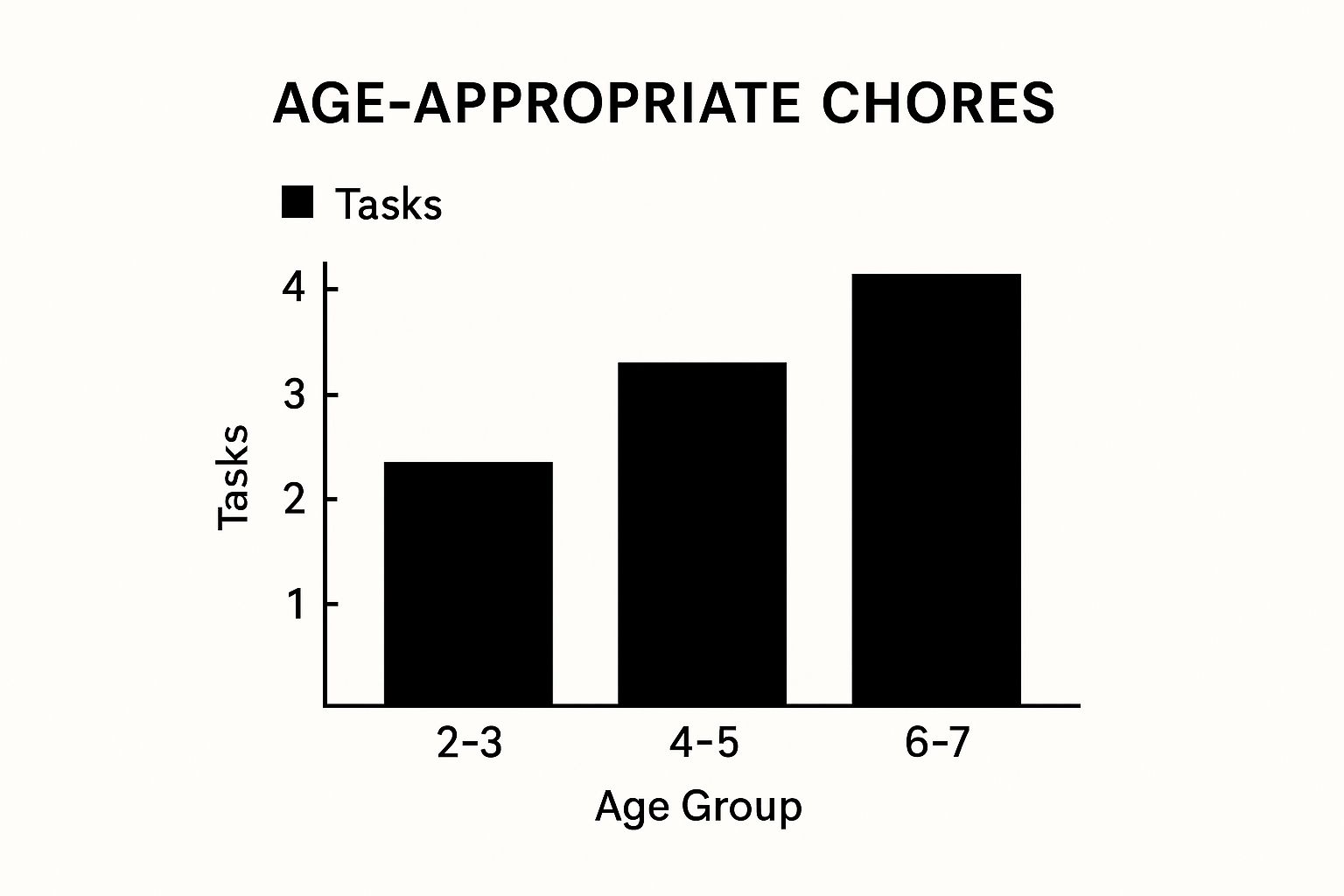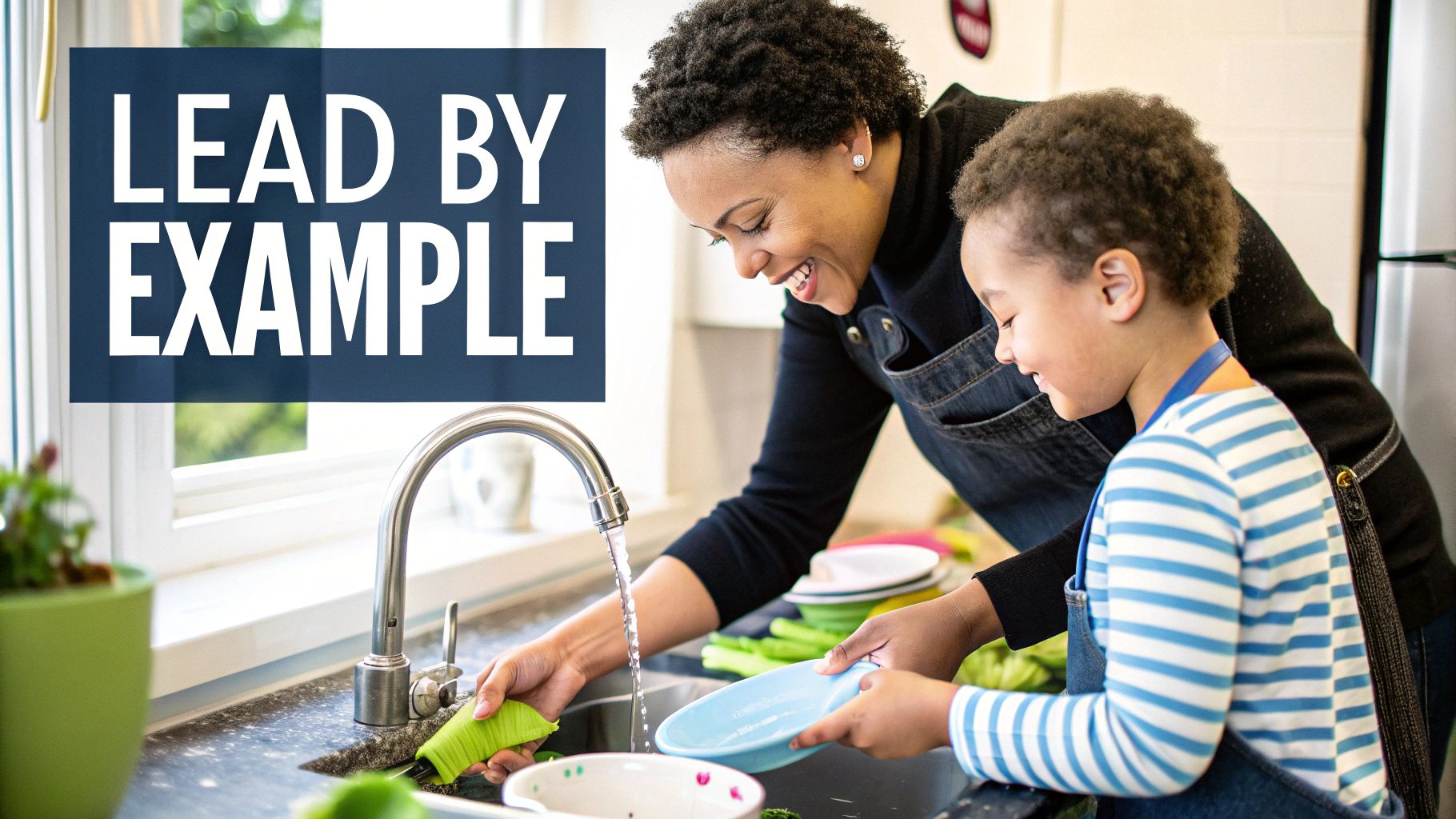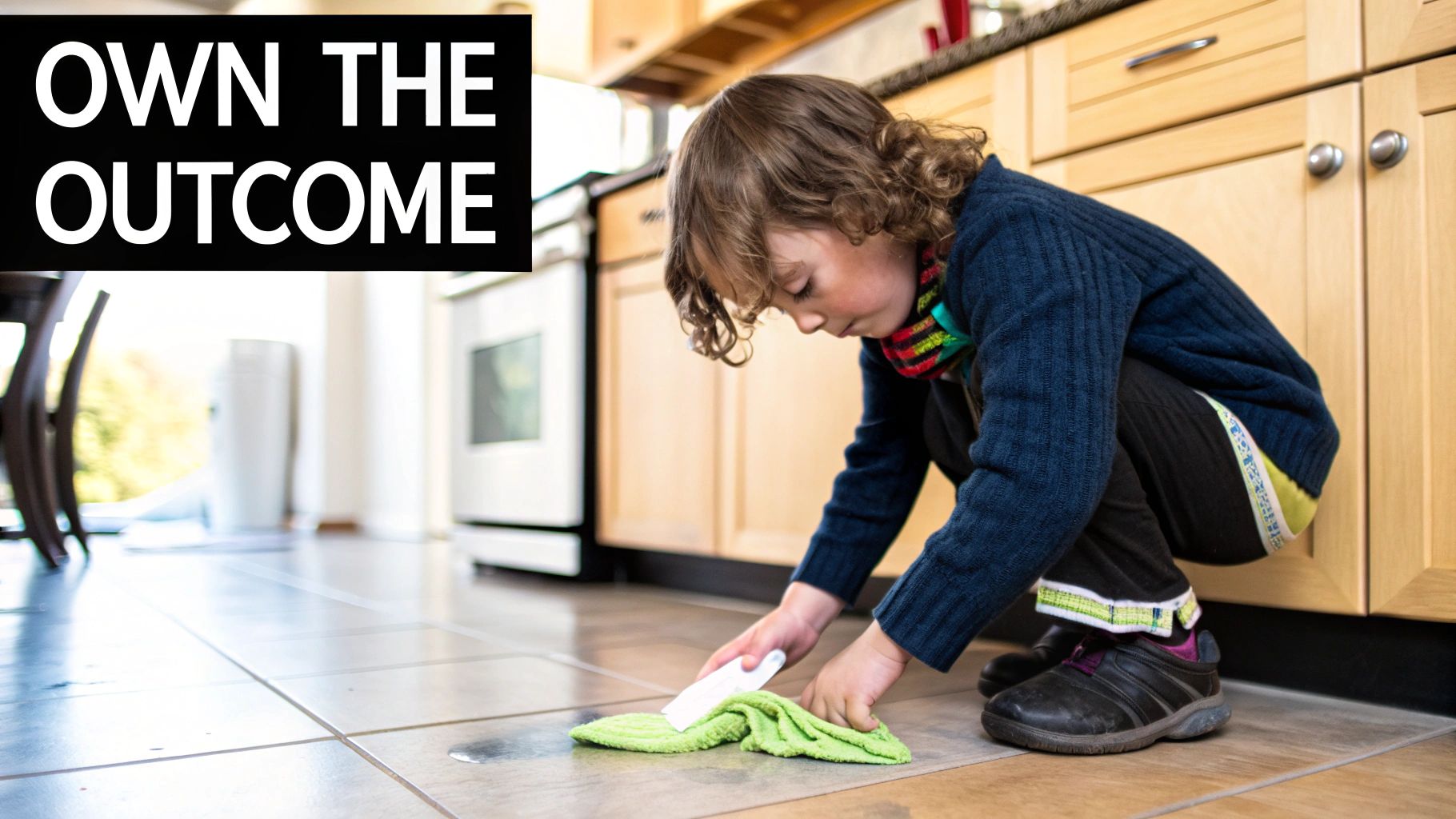A Practical Guide to Teaching Children Responsibility
Teaching your kids responsibility isn't just another item on the to-do list. It’s a long-term investment in who they become—resilient, confident, and capable. This is about weaving accountability into the fabric of your family's daily life, not just handing over a chore chart and hoping for the best.
Why Building Responsibility in Kids Matters Now

Look, I get it. As a busy dad, your plate is already overflowing. The idea of adding "teach responsibility" to the mix sounds exhausting. But what if we change how we think about it? This isn't just about getting help around the house. It's about forging the fundamental character your kids will rely on for the rest of their lives.
Fostering a sense of accountability is one of the most powerful things you can do for your child. It's way bigger than a tidy room or a perfectly made bed. It's the foundation for self-reliance, smart problem-solving, and real, earned confidence.
More Than Just Chores
When we teach our kids to be responsible, we’re really showing them how their actions affect not just themselves, but the entire family. They start to understand cause and effect in a safe space where mistakes are okay. This is how a real work ethic and a sense of belonging are born.
The goal is to move them from just complying with rules to actively contributing to the household. A kid who feels like a valued member of the team is way more likely to be motivated from within. And that internal drive? It’s infinitely more powerful than any sticker chart or punishment you can come up with.
Teaching responsibility is less about a spotless house and more about raising a human who knows how to handle life when you're not there to clean up their messes. It's an act of preparing them for the real world.
The Long-Term Payoff
Think of responsibility like a muscle. The more you help your kid exercise it with small, manageable tasks, the stronger it gets. Every time they feed the dog or put away their own laundry, they're building the capacity to handle much bigger challenges down the road.
This foundation is what supports the skills that truly matter:
- Resilience: They learn that messing up isn't the end of the world. It’s a chance to learn and try again, not a reason to quit.
- Self-Esteem: Finishing a task they were trusted with builds a type of self-worth that praise alone can't buy. It's real and it's theirs.
- Problem-Solving: When a kid is responsible for a chore, they’re also responsible for figuring out the little hiccups along the way.
Ultimately, teaching responsibility is about equipping your kids to walk out into a complicated world with their heads held high. It’s about turning them from passive kids who are cared for into active participants in their own lives. This guide is all about giving you practical, doable ways to start that don't feel overwhelming.
Setting the Stage with Age-Appropriate Tasks
The secret to teaching kids responsibility without turning your house into a battleground is surprisingly simple: match the task to the child. If you hand a five-year-old a job that's way over their head, you’re just setting everyone up for frustration. But give them a small, achievable task? That’s a win. You build their confidence and lay a positive foundation for the future.
This isn't about raising a tiny cleaning crew. It's about slowly building up their skills and sense of contribution. For a toddler, responsibility might just be learning to put their toy cars back in the bin. For a kindergartener, it could be putting napkins on the dinner table. These small acts teach them they have a valuable role in the family.
Start Small and Build Momentum
The trick is to begin with just one or two simple tasks that are easy to remember and weave into your daily rhythm. When a child masters something like putting their dirty clothes in the hamper, they feel a real sense of accomplishment. That feeling makes them much more open to tackling the next thing, like attempting to make their bed.
Don't overwhelm them with a long list. It's far better to have consistent success with two chores than a constant struggle with five. As they get older and more capable, you can gradually add more complex tasks. A kid who has mastered packing their own snack can eventually level up to packing their entire lunch.
This chart is a great visual guide for how responsibility can grow with your child, making sure they’re challenged but never overwhelmed.

As you can see, it’s all about a steady, manageable climb—not a sudden, stressful leap into a long list of duties.
A Practical Responsibility Roadmap
To make this dead simple for you, here’s a breakdown of tasks that generally work for different age groups. Think of this as a starting point. You know your kid best, so feel free to adapt this to their unique abilities and your family's needs.
Here's a quick guide to assigning tasks that align with a child's developmental stage. The goal is to foster skills without causing frustration.
| Age Group | Example Responsibilities | Skills Developed | Parent's Pro-Tip |
|---|---|---|---|
| Ages 2-4 | • Putting toys in a bin • Placing their dirty cup on the counter • Wiping up small spills with a cloth |
• Sorting and categorizing • Following simple directions • Motor skills |
Do it with them the first dozen times. Make it a game, not a demand. Use playful language like, "Time to put the blocks to bed!" |
| Ages 5-7 | • Making their bed (imperfectly) • Setting the table with napkins/utensils • Feeding a pet (with supervision) |
• Sequencing tasks • Empathy for others • Following a routine |
Create a simple visual checklist with pictures. Praise the effort loudly and specifically: "I love how you remembered to feed Max!" |
| Ages 8-10 | • Packing their own school bag • Unloading dishwasher items • Taking out the recycling bin |
• Organization • Planning ahead • Contribution to family |
Connect the task to a direct benefit. "When you unload the dishwasher, it helps me start dinner faster so we can play catch." |
| Ages 11+ | • Preparing a simple meal one night • Doing their own laundry • Managing homework schedules |
• Time management • Self-sufficiency • Problem-solving |
Give them more autonomy. Ask, "What's your plan for getting your science project done?" This shifts ownership to them. |
Remember to use this as a flexible guide, not a rigid set of rules. The most important thing is to get started.
The goal isn't perfection; it's participation. A lumpy bed made by a six-year-old is a bigger win for character development than a perfectly smooth bed made by a parent.
These lessons at home are more valuable than we often realize. While school provides structure, it's a privilege not all kids have. In fact, despite progress, 272 million children worldwide are still out of school, missing out on the daily routines that naturally build accountability. You can see the data and learn more about these educational challenges on the Global Partnership for Education's website.
It’s a powerful reminder of how crucial the lessons taught within the walls of a supportive home truly are.
Weaving Responsibility into Your Daily Family Life

While having a list of age-appropriate tasks is a solid start, the real magic happens when you stop thinking in terms of "chores" and start looking for opportunities for contribution. Getting kids to do stuff isn't the endgame. The goal is to cultivate a genuine feeling that they are a vital, contributing member of the family team.
This simple mental shift changes everything. Responsibility moves from being a dreaded list of duties to a natural part of your family’s daily rhythm. It's about finding accountability in the small, everyday moments. When kids feel they have a real stake in how the family operates, their own internal motivation finally kicks in.
From Morning Rush to Evening Reset
Mundane routines are prime territory for building these habits. That chaotic morning scramble to get out the door? It's a daily, real-world test of personal ownership. Instead of you running around grabbing backpacks and hunting for lost shoes, this becomes your child's domain to manage.
The same goes for the end of the day. A simple "10-Minute Family Tidy-Up" each evening before bedtime can be a game-changer. Everyone pitches in for a short burst to reset the shared living spaces. This isn't about one person cleaning up everyone else's mess; it's a team effort to maintain a home we all enjoy.
The objective is to make contribution feel like a normal part of family life, just like eating dinner together. When responsibility is woven into your daily fabric, it becomes a habit, not a battle.
This approach subtly changes your role. You go from being a manager who's constantly nagging to a teammate working right alongside them.
Giving Kids Ownership and a Voice
Real responsibility is more than just checking off a list. It's about making decisions and feeling a sense of ownership over the outcome. You can build this by pulling your kids into family planning and projects.
- Meal Planning: Let your kid choose—and help prepare—one family dinner a week. This could mean flipping through a cookbook, helping write the grocery list, or handling age-appropriate steps in the kitchen.
- Weekend Activities: Planning a family hike? Give them ownership of a piece of it. A younger child can be in charge of packing the snacks. An older one could research trail options and pick the route.
- Family Meetings: Regularly talking about how the household is running gives everyone a voice. It’s the perfect time to talk about what’s working, what isn’t, and how to fix it together. To make these conversations more collaborative and productive, check out our guide on creating an effective family meeting agenda.
These small acts of delegation send a powerful message: "I trust your judgment, and your input matters." That's a huge motivator.
For many kids, school provides a structure that reinforces these lessons in personal accountability. But that stability isn't universal. An estimated 234 million children in crisis-affected regions don't have access to the formal education that teaches social norms and daily routines. For these kids, education is a lifeline that helps build the very foundations of responsibility in chaotic environments. You can learn more about these global challenges from Education Cannot Wait.
This global perspective really brings it home. It highlights just how vital a stable, engaging home life is for turning everyday moments into powerful lessons in character and responsibility.
Letting Natural Consequences Do the Teaching
This is one of the hardest things to do as a dad, but it’s also one of the most powerful. When you let your kid experience the direct result of their actions—or inactions—you’re teaching a lesson that no lecture ever could. Our gut instinct is to jump in and fix things, to rescue our kids from any hint of failure or discomfort. But sometimes, the most loving thing you can do is step back.
This isn’t about punishment. Not even close. Punishment is something you invent to make a point ("You didn't do your chores, so no screen time for a week"). A natural consequence is what the world delivers all on its own. It's the universe's most patient teacher, and its lessons stick.
The Rescue Instinct vs. Real-World Learning
Every time you do a U-turn to run a forgotten lunchbox or permission slip back to school, you’re accidentally sending a message. It’s not the one you intend. The message they hear is: "Don't worry about remembering your stuff; I'm your human safety net."
It comes from a good place, of course. But it robs them of a prime opportunity to learn.
Your job is to shift from being the family's full-time problem-solver to its supportive coach. You’re on the sidelines, ready to help them think through what to do after the ball gets dropped, not to dive on the field and catch it for them. This is how they build the resilience and problem-solving muscles they’ll need for the rest of their lives.
Think about these real-life scenarios:
- The forgotten cleats: Your son gets to practice and realizes his soccer cleats are still by the front door. Instead of dropping everything to be his personal delivery service, you let him face the music. He has to explain to his coach why he can’t participate fully.
- The last-minute project: Your daughter puts off her big science project until the night before it’s due. The consequence isn’t a lecture from you about procrastination. It’s the grade she gets on the rushed, sloppy work she turns in.
- The blown allowance: Your kid gets their weekly allowance and spends it all on candy in one afternoon. The consequence is not having any money left when the ice cream truck rolls around on Friday.
In every case, the lesson is tied directly to the choice. It’s logical, it makes sense, and best of all, you don't have to be the bad guy.
How to Handle the Fallout
Your reaction when the consequence lands is absolutely critical. This is your chance to turn a moment of failure into a lesson in ownership—without shame. The key is to stay calm and empathetic while holding the boundary.
Your job isn't to add to their frustration with an "I told you so." They're already feeling the sting of the consequence. Your role is to be the calm voice that helps them connect the dots for next time.
When your son gets home, bummed about having to sit on the bench during soccer practice, resist the urge to lecture. Instead, try a collaborative, forward-looking approach.
Something like, "Man, that must have been a huge bummer watching from the sidelines. What's one thing we could do to make sure you remember your cleats for Thursday's game?"
This kind of response does two brilliant things:
- It validates their feelings: "That must have been a bummer" shows you get it.
- It prompts problem-solving: You’re guiding them to create their own system, which builds real-world planning skills.
Letting natural consequences do the heavy lifting is a total game-changer. It shifts the dynamic from you nagging them to them learning to manage themselves. It feels tough in the moment, I get it. But you're not just solving today's forgotten-lunch problem; you're building a more capable, resilient, and self-reliant adult for tomorrow.
Using Your Words to Build Accountable Kids

The words you use as a dad hold some serious weight. They can turn a simple request into a power struggle or, with a slight tweak, transform it into a genuine learning moment.
When it comes to teaching responsibility, lecturing your kids about what they should do is almost always a dead end. But a simple shift in how you phrase things? That can make all the difference.
Instead of barking commands, try asking questions. It’s a small change, but it flips the dynamic from conflict to collaboration. It puts the ball in their court, nudging them to think for themselves and start building their own internal sense of accountability.
From Nagging to Nudging
Let’s get practical. The next time you feel the words, "You need to do your homework right now!" about to leave your mouth, just pause. Take a breath. Try a different angle.
Ask a question that invites them to create a plan:
- "So, what’s your plan for getting your homework done before dinner?"
- "The trash needs to go out tonight. When do you think you can tackle that?"
- "Whoa, your room is getting a bit wild. What’s the first thing you think you should do to get it under control?"
This approach does so much more than just get the task done. It quietly communicates trust. It tells them you respect their ability to manage their own time and solve problems. You’re no longer the enforcer; you’re the coach helping them map out a strategy. This is a huge piece of building their emotional intelligence as a parent, as it encourages self-awareness and self-management.
The goal is to shift from being the source of all the answers to being the guy who asks the best questions. That’s how kids learn to think for themselves.
Praise the Process, Not Just the Result
How you praise your kids is just as critical. Instead of a generic, "You finally cleaned your room, great job," focus on the effort and consistency it took.
Try phrases that spotlight the hard work:
- "I saw you focusing on that project for a whole hour without getting distracted. That's real dedication."
- "You remembered to feed the dog all week without me saying a word. I really appreciate how consistent you've been."
This kind of specific praise reinforces the behavior you actually want to see more of—the follow-through, the planning, the grind. It teaches them that the process matters just as much, if not more, than the perfect outcome. That’s a cornerstone of real responsibility.
A child’s mental state is also a huge factor here. The KidsRights Index 2025 has highlighted a growing crisis in children's mental health. Studies show that kids who feel safe, valued, and heard at home are far more likely to take initiative and own their commitments. In contrast, when kids feel insecure, their capacity to develop responsibility takes a massive hit. You can find more on this in the KidsRights 2025 report.
Creating a supportive home where your words build them up isn't just nice—it's a direct investment in their future.
Common Questions About Teaching Responsibility
Even with the best game plan, you’re going to hit some snags. Let's be real, teaching kids to be responsible is a marathon, not a sprint, and you’re bound to face a few common challenges along the way. This is the troubleshooting guide—quick, field-tested answers for the hurdles most dads run into.
What If My Child Just Refuses to Do Their Tasks?
First, don't let it escalate into a power struggle. That’s a no-win situation. Before you react, take a breath and quickly gut-check: is the task clear? Is it genuinely age-appropriate? If the answer is yes, the next move is to calmly and firmly connect the responsibility to a privilege they want.
For example, instead of a standoff over a messy room, you can simply say, "As soon as your toys are put away, we can fire up that movie." This isn't a punishment; it’s just the natural order of things. If the refusal continues, let it go for now. Find a quieter moment later to talk. Try asking a curious question like, "That task seems to be really tough for you lately. What's going on?" Digging for the root cause—feeling overwhelmed, distracted, or just plain stuck—is way more productive than winning the battle.
A child’s refusal is often communication in disguise. It’s an invitation to understand what’s really happening under the surface, not just an act of pure defiance. Getting to the ‘why’ behind the ‘no’ is everything.
Should I Pay My Kids for Doing Chores?
This is the classic debate, and honestly, there's no single right answer. But here’s an approach that works incredibly well for teaching two different, equally important life lessons: one about community and one about work. The key is to separate "family contributions" from "work-for-hire" jobs.
- Family Contributions (Unpaid): These are the things we all do because we're part of the family team. Think making their own bed, clearing their plate after dinner, or putting their dirty clothes in the hamper. These are non-negotiable and aren't tied to money. They're about pitching in.
- Work-for-Hire (Paid): These are the extra jobs that go above and beyond daily expectations. This could be washing the car, weeding the garden for an hour, or helping you organize the garage. Paying for these tasks teaches the direct link between extra effort and earning money.
This system draws a clear line between being a helpful member of the household and learning how to hustle for a goal.
My Partner and I Disagree on How to Handle This
A united front is non-negotiable. I can't stress this enough. Kids are masters at finding the cracks between parents and will absolutely use them to their advantage. You and your partner have to get on the same page. Find a time to talk when the kids aren't around. For a deeper dive into making these strategies work for your family, our complete guide on teaching kids responsibility offers more detailed frameworks.
Start the conversation by focusing on your shared long-term goals. What kind of person do you both want to raise? What character traits matter most to you? Once you're aligned on the "why," the "how" gets a lot easier to figure out. Settle on a few core responsibilities and what happens when they aren't met, then commit to backing each other up. Your styles don't have to be identical, but your rules must be consistent.






